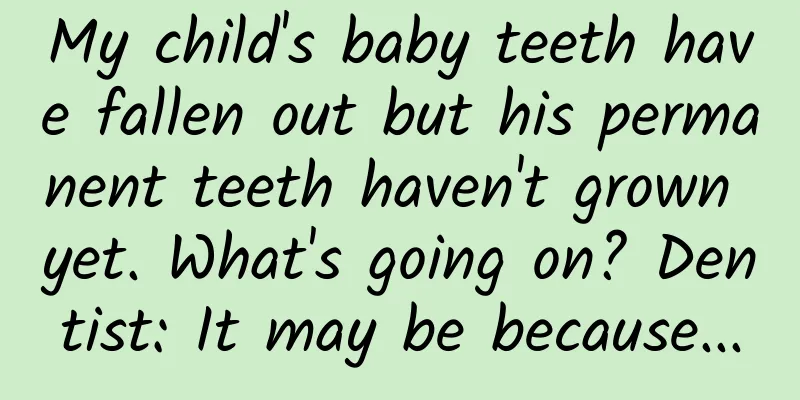My child's baby teeth have fallen out but his permanent teeth haven't grown yet. What's going on? Dentist: It may be because...

|
Parents asked: Doctor, my child’s baby teeth fell out on time, but the new permanent teeth look weird. Dentist: Generally speaking, in this case, we first consider the supernumerary teeth. We recommend that you bring your child to the hospital for a panoramic X-ray. Sure enough, the newly grown tooth was indeed a supernumerary tooth. In addition, another inverted supernumerary tooth was found in the jawbone. This supernumerary tooth was slanted above the permanent tooth, which must have affected the eruption of the permanent tooth. It was recommended to remove it. Dentist's explanation: The phenomenon of supernumerary teeth similar to the above is quite common in clinical practice. Some supernumerary teeth are found after they grow out and are removed in time, so that the permanent teeth are not affected. However, some supernumerary teeth are buried in the jawbone and secretly affect the permanent teeth. Therefore, it is necessary for children in the tooth replacement period to see the dentist regularly. Especially for children around 5 to 7 years old, it is recommended to take a panoramic film, which can clearly show the development of the permanent tooth germ under the jawbone. 01 What are supernumerary teeth? As the name implies, supernumerary teeth are actually extra teeth that grow beyond the normal range of tooth arrangement, also known as "extra teeth". Normally, humans have 20 teeth in the deciduous dentition and 28-32 teeth in the permanent dentition. Teeth beyond these are supernumerary teeth. They usually grow when children are changing their teeth. Supernumerary teeth are one or more teeth in the dentition. They are less common in the deciduous dentition and more common in the mixed and permanent dentition. The most common supernumerary teeth are the central teeth, which are located between the two maxillary central incisors. 02 Why do supernumerary teeth occur? The cause of supernumerary teeth has not yet been identified, but heredity is considered an important factor in the occurrence of supernumerary teeth. Many case reports have found that multiple members of the same family have supernumerary teeth. Other possible causes are abnormalities in the development of tooth germs. The two most common diseases, cleft lip and palate and cleft sphenoid syndrome, can cause multiple impacted supernumerary teeth. 03 What are the dangers of supernumerary teeth? Supernumerary teeth can be located anywhere in the jawbone, erupting in the oral cavity or buried in the jawbone. Some supernumerary teeth have inverted crowns and roots, and some are even located in the nasal cavity or maxillary sinus. Supernumerary teeth can easily prevent permanent teeth from erupting smoothly. Even if they do erupt, they are not aligned properly, are overcrowded, and easily hide food residues, which creates conditions for caries and pulpitis, and affects the appearance. 04 How to deal with supernumerary teeth that fail to erupt? 1. Timely extraction of erupted supernumerary teeth will help the adjacent permanent teeth to erupt smoothly and reduce the misalignment of permanent teeth. 2. If impacted supernumerary teeth affect the development, eruption and arrangement of permanent teeth, they should be extracted as soon as possible without damaging the permanent tooth germs. 3. If it does not affect the development and eruption of the permanent tooth germ, it can be extracted after the permanent tooth root development is completed. 05 How can parents detect supernumerary teeth in their children in time? The diagnosis and treatment of supernumerary teeth require X-rays to be confirmed. Common X-rays include periapical films, full-mouth curved films and CBCT. Despite this, parents still need to pay more attention to their children's supernumerary teeth! Tips for finding supernumerary teeth: (1) Parents should be aware that supernumerary teeth are most commonly found in the maxillary anterior area clinically, and are most common in the mixed dentition period (6-12 years old), with males more likely than females; followed by the permanent dentition period (after 12 years old); and finally, the deciduous dentition period (before 6 years old), which is less common; (2) Children with retained deciduous teeth, twisted adjacent teeth, or large interdental spaces; (3) After the deciduous teeth fall out, the children's young permanent teeth are delayed in eruption, impacted, or have abnormal eruption directions; If the above phenomenon occurs, parents should take their children to a regular dental hospital for examination in time to rule out the possibility of supernumerary teeth. |
>>: What happens when the brain and muscles lose connection?
Recommend
What is the treatment for ovarian cysts in women?
In women's lives, ovaries are secondary sexua...
What causes itchy red spots on the vagina?
Girls usually don't pay attention to the cond...
What causes vaginal bleeding the day after sex?
A perfect sex life can make the relationship betw...
Why do I always feel hungry during pregnancy?
Everyone knows that when a woman becomes pregnant...
How does gynecological anaerobic infection occur?
Common Pseudomonas aeruginosa infections in gynec...
Regularly staying up late vs occasionally sleeping late, which one is more harmful to the thyroid gland? 6 tips for sleeping well for a healthy thyroid gland
I heard that staying up late can easily lead to t...
Will I have a fever when I'm pregnant?
The most common cause of body heat, other than hi...
Why is it that babies are prone to catching colds in winter? What should I do if my baby is prone to catching colds in winter?
We all know that the weather is cold in winter, a...
Can Candida be cured?
Every woman should keep her lower body absolutely...
Who is Xu Guanghan's ex-girlfriend? What is Xu Guanghan's ex-girlfriend Jian Jie's Instagram name?
Since Xu Guanghan became popular, some people hav...
How long does it take for postpartum urticaria to heal itself?
Many women have a period of physical weakness aft...
Why do the more outstanding children tend to be more distant from their parents? Is it true that outstanding children do not take care of their parents?
There is no parent who does not want their childr...
What should I do if the persimmons I grow are not sweet? What kind of soil is suitable for growing persimmons?
Persimmons are nutritious fruits and can also be ...
Will obesity cause amenorrhea?
In real life, some overweight women may have mens...
What is the reason for the slow opening of the cervix?
The childbirth process for women is very stressfu...









